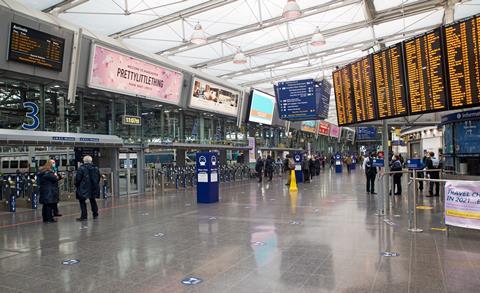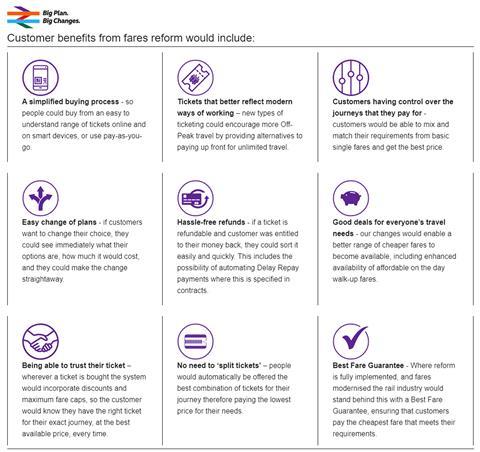
UK: With this year’s annual fares increase coming into force from March 1, the Rail Delivery Group has sought to remind passengers and commentators that decisions over fares are made by the government, while reiterating that the rail sector has already put forward proposals for reform.
Commenting on the decision to increase regulated fares by RPI+1 (2·6%), RDG Director of Nations & Regions Robert Nisbet explained that ‘ultimately, government decides how much it wants passengers to pay towards the cost of running the railway. To give passengers better value, we want to work with government to recast how people buy their fares. We want the whole country to benefit from a new, more flexible system which incentivises more people back to the network and helps drive a truly national economic recovery.’
A Department for Transport source quoted in the Sunday Telegraph on February 28 said that ‘we have written to all rail operators to ask that they begin immediate work on developing a flexible season ticket’ which would ‘reflect modern working lives’, amid suggestions that flexible tickets, valid for two or three days a week, might be available ‘in the first half’ of this year.
Although operators were asked to present proposals in 2020, industry insiders reported that delivering a plan within the existing ticketing system that would meet Treasury requirements for changes to be ‘revenue neutral’ was proving to be a stumbling block. Season tickets are often seen as the base revenue for many operators, and without taxpayer support to cover any losses from the savings passed through to users, the pre-Covid service levels could not be sustained. Nevertheless, Nisbet suggested on March 1 that RDG was hoping to announce the first part time seasons by June 21.
Research by Rail Business UK shows that if two-day season tickets were priced pro-rata to existing seven-day, monthly or annual seasons, they could be cheaper than a Standard Open return fare. At present, season tickets effectively have the same restrictions as full Open tickets, with no time limits. The situation would worsen if part-time season fares were based on a division by seven rather than an assumed five trips per week — many commuters also use their season tickets for leisure travel at weekends, effectively at no additional cost. And the savings per journey would increase further if a monthly or annual season were used as the basis for pricing.
Sample fares – Reading to London Paddington
| Ticket type | Fare | Price per journey |
|---|---|---|
|
Open Return |
48·90 |
48·90 |
|
Off-Peak Return |
21·30 |
21·30 |
|
Seven-Day Season |
118·60 |
23·72 |
|
Flex 2/5 |
47·44 |
23·72 |
|
Flex 3/5 |
71·16 |
23·72 |
|
Flex 2/7 |
33·88 |
16·94 |
|
Flex 3/7 |
50·83 |
16·94 |
RDG recognises that ‘increasing the number of people travelling by train when travel restrictions ease is essential to increasing fare revenue, reducing pressure on public finances, boosting economic activity, creating jobs and keeping fares down in future’.
According to analysis by Jacobs, which was commissioned by RDG to analyse survey data from July and August 2020, the time that rail commuters expect to work from home post-lockdown has risen from 0·5 to 2·6 days per week.

Once-in-a generation opportunity
Building on research that shows 80% of passengers want the fares system overhauled, RDG says now is the chance for ‘a once in a generation reform of the fares system’. It believes that reform could enable: ‘tap-in, tap-out’ pay-as-you-go functionality being rolled out across the country; greater local control over fares in devolved areas; and better integration of rail fares with those for other modes, as well as flexible seasons for commuters.
‘Simple fares to suit flexible commuters are key to avoiding a car-led recovery’, commented RDG Chief Executive Jacqueline Starr, noting that current fares regulations created in the 1990s ‘have not kept pace with changes in technology or travel patterns’. She pointed to RAC research which suggests that up to 15% of pre-pandemic rail commuters could switch to road in the longer term. Emphasising that ‘the time for sticking plasters is over’, she insisted that ‘only government has the power to change rail fare regulations and as the light at the end of the tunnel of this pandemic becomes brighter, there’s no time to lose.’
In response to passenger demands for ‘value-for money and flexibility’ and an ‘easy to understand offer’, RDG has proposed a ‘root-and-branch reform of the current system’ through a two-stage approach.
In stage one, the rail sector and government would work together to reform the way that fares are calculated, with DfT replacing the outdated Ticketing & Settlement Agreement by a new set of system regulations. Once these new regulations were in place, the second stage would require commercial changes to be agreed with operators, and the new pricing regulations written in to their franchise operating contracts.

RDG proposes an ‘unbundling’ of fares, through a move to a single leg fare as the basic unit for all pricing, with algorithmic rules underpinned by regulation to encourage the best combinations for through ticketing, returns and multi-journey tickets. Train operators would be able to create discounted, premium, train specific and personalised variations, such as charging less at quieter periods or for reduced flexibility, and higher rates for first class. Insisting that fares should be ‘priced appropriately to market and not simply the sum of their parts’, RDG says protection from excessive fares would come through ‘regulation of price levels rather than of a limited number of specific fare types that may not reflect customers’ needs.’
RDG says it is looking to set up ‘a series of real-world trials to further test and refine how the propositions would work in practice’, before rolling out the new ticketing arrangements over the next three to five years.



